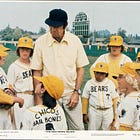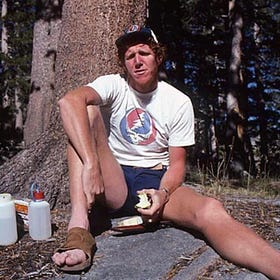This Week's Top Ten
Odds, ends and Ted Cruz.
This is Throwbacks, a newsletter by me, Michael Weinreb, about sports, history, culture and politics, and everything in-between.
If you like what you read, please click the button below, join the mailing list for FREE and share, on social media or through e-mail or however you feel comfortable sharing.
And if you’ve been reading for a while, please consider a paid subscription to keep this thing going—you’ll get full access to the archive of over 150 articles, like this one:
I. Ted Cruz, R-Texas
One of the best books I’ve ever read about college sports is called A Payroll To Meet, by the journalist David Whitford. (It is so good, in fact, that it inspired me to write my first-ever screenplay a few years ago.) Whitford’s book is about the mechanics of the scandal that brought down the SMU football program in the 1980s, but mostly, it’s about money and greed and how all of those things led powerful men to shower money on college football players while simultaneously using them as pawns.
A Payroll To Meet is, in other words, the American story in a microcosm. And I thought about it again this week, as I read this excerpt from a New York Times interview of Texas Senator Ted Cruz by the otherwise reasonable Michigan apologist Jane Coaston:
Coaston: I’ve been paying attention to this issue for a long time, and it’s been wild to see a lot of conservatives from Justice Kavanaugh on down basically say, “Athletes should receive compensation for the work they do in some form,” versus how people were talking about this issue when, say, S.M.U. got in trouble with the N.C.A.A. in the 1980s. What changed? Do you think that there are generational divides? What changed here?
Cruz: It’s a good question and candidly, I don’t know. I will say it is, I think, a very conservative position. The very essence of the free market is that if you develop a skill that is marketable and that there is demand for, you should be compensated for that and be able to make a profit. And the disparity was becoming really stark in a way that I think fundamentally wasn’t fair.
The title of A Payroll To Meet stems from a meeting between SMU’s athletic director and Republican Bill Clements, who was the head of the university’s board of governors and would soon run for (and win) a second term as governor of Texas. At issue was whether the under-the-table payments from an SMU-booster backed slush fund should cease or continue. The board voted to end the payments; Clements decided that SMU had “a payroll to meet,” and the payments continued, which, when revealed, led the NCAA to shut down the SMU program prior to the 1987 season.
This week, of course, the principle of amateurism that allowed scandals like SMU to proliferate for more than a century essentially came to an end. College football players will be paid; it’s just a matter of how, and how much. There is a lot to process here, but one of the odd footnotes to it all is on display in that Q-and-A with Cruz, in which one of the most universally loathed politicians in America alludes to the strange hypocrisy that led the push toward free-market ideals in college sports to be championed largely by progressives, many of whom didn’t care nearly as much about college sports as the people in Ted Cruz’s own state did.
It’s almost enough to make you think about how the yearning for power can make one sacrifice their ideals, and lead one to either engage in or condone unethical—or outright illegal—behavior. But of course, I imagine Ted Cruz has never contemplated such a thing.
II. Charlie “Chino” Smith, Negro League baseball player
The coolest part of MLB’s decision to incorporate Negro League statistics into the Major League statistics are the discoveries to be made and the stories to be retold. Take Charlie “Chino” Smith, who was apparently one of the greatest hitters you’ve never heard of, who regularly taunted fans and opponents, who hit .488 one year and then died mysteriously before the age of 30.
III. Bill Walton, basketball player/West Coast ambassador
I wrote my own paean to Walton and the West Coast ethos this week…
California Star (1977)
This is Throwbacks, a newsletter by me, Michael Weinreb, about sports, history, culture and politics, and everything in-between. If you like what you read, please click the button below, join the mailing list for FREE and share, on social media or through e-mail or however you feel comfortable sharing.
…but I really dug Christopher Kamrani’s essay about Walton’s indomitable spirit over at The Athletic.
IV. Powder Blue Philadelphia Phillies Uniforms, 1972-1988
In a previous life, I was a fan of Philadelphia sports, before I came to know better…





